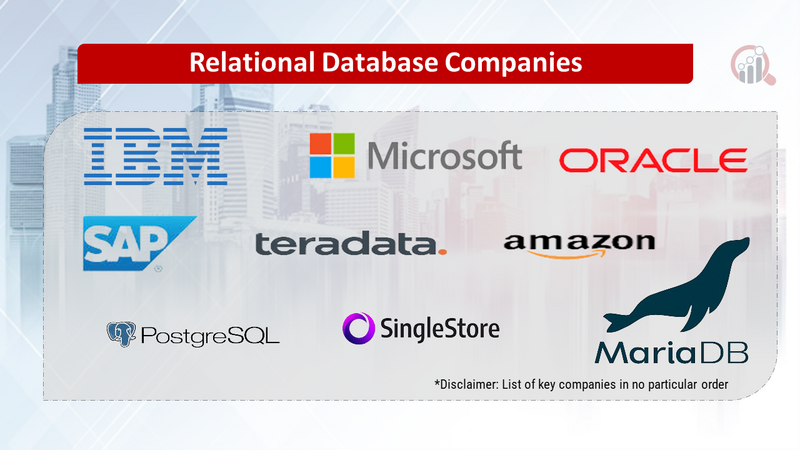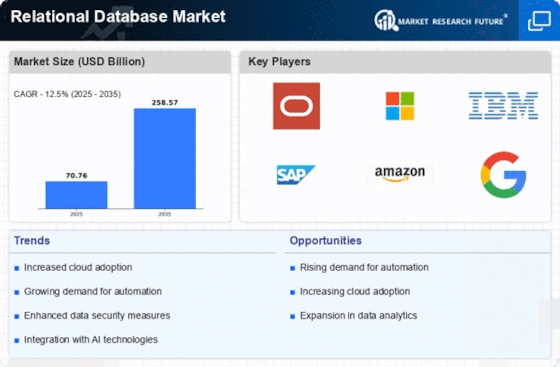Top Industry Leaders in the Relational Database Market

Relational Database Market: Dive into the Latest News and Updates
In the era of Big Data, relational databases (RDBMS) remain a foundational technology for managing structured data across diverse industries. Understanding the key players, their strategies, and the factors influencing market share analysis is crucial for navigating this mature yet evolving landscape.
Some of Relational Database Companies Listed Below:
- Oracle Corporation
- Teradata Corporation
- IBM
- SAP SE
- PostgreSQL
- Amazon.com Inc
- MariaDB
- Informix Corporation
- Sequel Pro
- Microsoft Corporation
- SingleStore
- TmaxSoft
- Connx Solutions
- MongoDB
- Couchbase
- Aerospike
Strategies Driving Market Growth:
- Cloud Migration and Digital Transformation: The shift towards cloud-based infrastructures compels existing RDBMS vendors to expand their cloud offerings and develop new cloud-native solutions.
- Enhanced Performance and Scalability: Investing in RDBMS capabilities like in-memory processing, query optimization, and distributed architectures caters to the growing demand for real-time data access and scalability.
- Focus on Security and Compliance: Implementing robust security features, data encryption, and compliance with stringent regulations like GDPR and CCPA builds trust and attracts security-conscious organizations.
- Integration and Interoperability: Offering seamless integration with various data management tools, analytics platforms, and applications fosters a data-driven ecosystem and improves usability.
Factors Influencing Market Share Analysis:
- Target Market and Use Case: Understanding the specific data management needs of different industries, organizational sizes, and application types is crucial for tailoring solutions and achieving market success.
- Technology Innovation and Feature Differentiation: Offering advanced features like geospatial data support, JSON document storage, or graph database capabilities differentiates offerings and attracts specific user segments.
- Cloud Integration and Deployment Flexibility: Providing on-premise, cloud-based, and hybrid deployment options caters to diverse user preferences and infrastructure realities.
- Total Cost of Ownership (TCO) and Pricing Models: Balancing performance with affordability and offering flexible pricing models attracts budget-conscious users and expands market reach.
New and Emerging Companies:
- Focus on Niche Needs and Specialized Functions: Players like ScyllaDB, Cockroach Labs offer high-performance, distributed RDBMS solutions addressing specific needs like scalability and horizontal growth.
- Integration with IoT and Big Data Technologies: Companies like TimescaleDB integrate with IoT platforms and offer time-series database functionalities, catering to the needs of IoT data management.
- Focus on Blockchain-Enabled Databases: Startups like Hedera Hashgraph, PartiQL explore blockchain technology for enhanced data security, immutability, and tamper-proof records, addressing emerging requirements in specific industries.
Current Investment Trends:
- Venture Capital Funding: Innovative startups developing specialized RDBMS solutions and leveraging cutting-edge technologies like blockchain attract significant venture capital funding, fueling market diversification and innovation.
- Strategic Partnerships and Acquisitions: Established players are partnering with startups or acquiring niche expertise to expand their offerings and address emerging market needs.
- Investments in Cloud Technologies and AI-Powered Tools: Growing investments in cloud data management platforms and AI-powered data analysis tools create opportunities for integration with RDBMS solutions, increasing their value proposition.
Latest Company Updates:
- Oct 26, 2023: The growing importance of data privacy and compliance is prompting RDBMS vendors to invest in enhanced security features and privacy controls within their platforms.
- Dec 15, 2023: The rise of low-code/no-code development platforms is facilitating easier access and management of relational databases for non-technical users.










